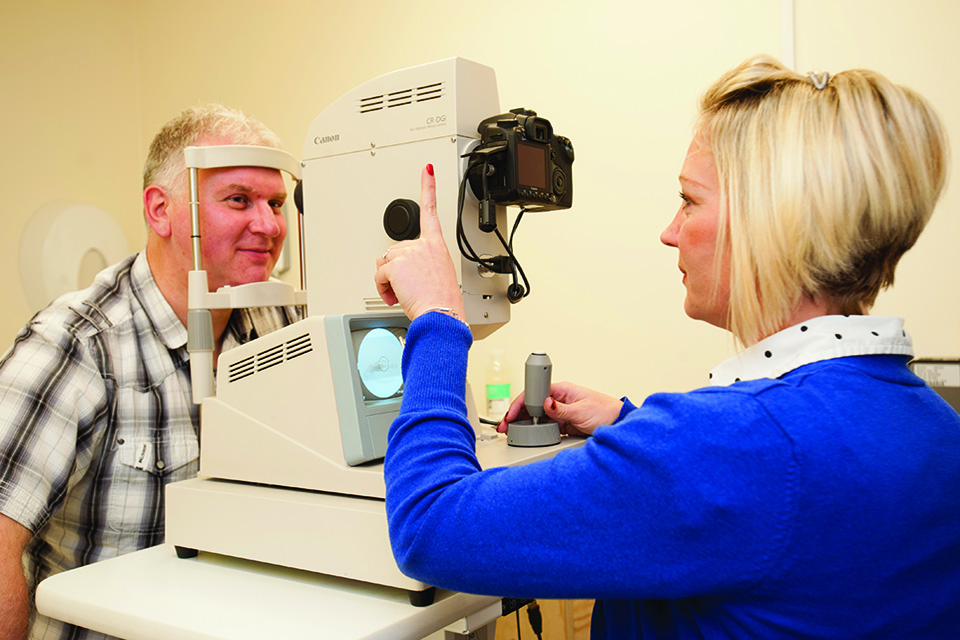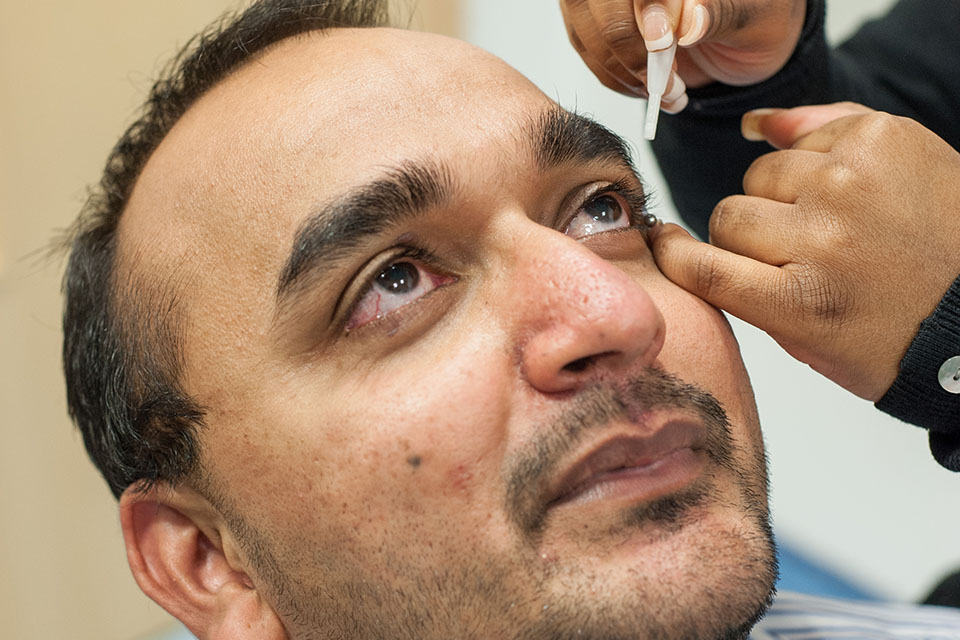Your guide to diabetic eye screening
Updated 3 March 2025
Applies to England
You can choose if you take part in diabetic eye screening. This guidance aims to help you decide.
Why the NHS offers diabetic eye screening
Diabetic eye screening is an important part of your diabetes care. We offer screening as it helps to prevent sight loss.
As someone with diabetes, your eyes are at risk of damage from a condition called diabetic retinopathy. Screening can detect retinopathy before you notice any changes to your vision.
Diabetic eye screening is not part of your normal eye examinations with an optician. Screening does not look for other eye conditions. You should continue to visit your optician for regular eye examinations as well.

A screening practitioner takes digital photos of a patient’s eyes
Diabetic retinopathy
Diabetic retinopathy occurs when high blood sugar levels damage the back of the eye. It can cause the blood vessels in the retina to leak or become blocked.
Untreated diabetic retinopathy can cause sight loss. When it’s found early enough, treatment can reduce or prevent damage to your sight.
How we do diabetic eye screening

Eye drops being administered prior to screening test
A diabetic eye screening appointment usually takes about 30 minutes:
-
We’ll ask you to read some letters on a chart.
-
We’ll put drops in your eyes. These may sting for a few seconds and may make your sight blurry.
-
When the drops start working, we’ll ask you to look into a camera. The camera will not touch your eyes.
-
We’ll take pictures of the back of your eyes. There will be a bright flash.
When we invite you for diabetic eye screening
We invite everyone with diabetes aged 12 and over for diabetic eye screening.
How often we invite you depends on the results from your last 2 screening appointments. We will invite you for screening every 1 or 2 years if we do not find diabetic retinopathy.
Possible risks of diabetic eye screening
No screening test is 100% reliable.
The eye drops may sting for a few seconds, but screening is not painful and the equipment will not touch your eyes.
For up to 6 hours after the test:
-
your sight may be blurry so do not drive until it goes back to normal
-
everything can look very bright, but wearing sunglasses can help
Diabetic eye screening results
We aim to send your results letter to you and your GP within 3 weeks.
A clinical expert checks the photographs of your eyes after your screening.
If we do not get a clear result, we may call you back for another assessment.
There are 3 types of result for diabetic changes to the back of your eyes:
-
no changes, called no diabetic retinopathy
-
some changes to your eyes, called background retinopathy (stage 1)
-
eye damage that could affect your sight, called referrable retinopathy. You may have either pre-proliferative retinopathy (stage 2) or proliferative retinopathy (stage 3)
Your results letter will explain this in more detail.
Depending on your results, you may need a follow-up appointment. This is to see if you need treatment or more frequent checks. We may do a more detailed check of your eyes using a different type of camera. This is sometimes called optical coherence tomography (an OCT scan).
Practical hints and tips on the day
Bring all the glasses and contact lenses you wear along with lens solution for your contacts.
Bring sunglasses as your eyes can feel sensitive after having the eye drops.
You may want to bring someone with you to the appointment. You should not drive until your vision returns to normal, which can take up to 6 hours.
How to reduce your risk
You can help to reduce your risk if you:
-
control your blood glucose as effectively as possible
-
see your doctor regularly to check your blood pressure
-
attend all your diabetic eye screening appointments
-
get advice if you notice any changes to your sight
-
take your diabetes medication as prescribed
-
exercise regularly, following medical advice
More information and support
Read your screening invitation for details of what you need to do next.
You can also:
-
read more information on diabetic eye screening on NHS.UK
-
read our leaflet on diabetic retinopathy, if you need regular monitoring or treatment
-
find more on diabetic retinopathy and support available at Diabetes UK.
This information is available in alternative formats, including easy read and other languages. To request another format, phone 0300 311 22 33 or email england.contactus@nhs.net.
We use personal information from your NHS records to invite you for screening at the right time. NHS England also uses your information to ensure you receive high quality care and to improve the screening programmes. Read more about how we use and protect your information.
Find out how to opt out of screening.
